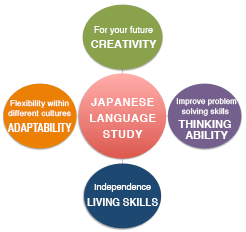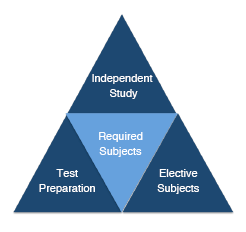盛岡情報ビジネス専門学校 日本語学科 Morioka Japanese Language School
Department Summary
Department of Japanese Language
1. What we expect students to be.

As most of students enrolled Morioka Japanese Language School (MJLS) are first-time visitors to Japan and stay for some years not only do we wish students to master Japanese but we also hope they have a successful stay. We sincerely instruct and expect students to be independent by learning through daily life in Morioka.
Students will be provided essential Japanese language knowledge which will be valuable after going on to university, college or any professional schools. Moreover, we believe it will be a great benefit as students work for Japanese companies in the future.
Independence for Living: We help students support themselves including food, clothing and housing.
Adaptability: We teach Japanese culture which is different from other countries’ and help them to adapt to Japanese society.
Thinking Ability: Students will develop thinking ability by creating their learning plan and evaluating themselves.
Imagination: We instruct students to make their future plans with based on the latest global situation and technology trends.
2. Curriculum

Our compulsory curium is well designed to deal with the EJU (Examination for Japanese University Admission for International Students), in addition optional classes are available such as specialized subjects and preparatory classes for exams. Also we strongly recommend students to do self-study so they will gain more knowledge and develop stable skills.
Targeted goal for each levels
| Level | Attainment Targets. | Guideline of JLPT Level | Course Hours |
|---|---|---|---|
| Elementary | Focus on the acquisition of basic Japanese grammar in order to communicate, read, write and listen in everyday basic situations. Also Kanji leaning in an efficient way helps to improve everyday conversation. | N5/N4 | 300h |
| Pre- Intermediate | Revise basic grammar and start leaning intermediate knowledge. After this level completed, most of students have enough ability to write and speak in daily life. | N3 | 300h |
| Intermediate | Begin to understand more challenging vocabulary, expressions and abstract words, which helps to obtain some information from newspaper or TV news. | N2 | 500h |
| Upper Intermediate | Without major problems, students of this level mostly understand daily conversation as native Japanese do. Also start to understand the outline of novels and essays. Moreover they can deal with basic business expressions. | N1 | 500h |
| Advanced | Students will be able to take classes and join a discussion at higher education institute (University, Vocational School). They will deal with more complex and abstract expressions. |
Optional Courses
Besides compulsory curium, optional courses are offered for your needs and interest which must support your future plan. Courses are designed to strengthen your knowledge and cover your weak subject and give you more information of Japanese culture. Courses are not divided into levels therefore students can be inspired and stimulated by advanced students. With this enthusiasm, it is possible to improve their knowledge drastically.
Optional courses: General Subjects, Kanji I II, Science(EJU), Math(EJU),Conversation I II, Classical Japanese, Pronunciation, ,Reading, Japanese Culture, Business Japanese, Morioka Dialect, Essay, Extensive Reading.
*Subjects can be changed.
JLPT & EJU
Our compulsory curium is well designed to enhance knowledge of the JLPT and EJU. Additionally, extra preparatory classes are organized just before both exams.
Self-Study
Each student face individual issues such as poor listening, difficulty in remembering Kanji, willingness to gain more knowledge, Passing JLPT N2 levels and so on. As a solution, we strongly recommend students to begin with planning and preparation for Self-Study by using PDCA cycle method. Students discuss with teachers how they do Self-Study and redo their plans if necessary which makes students study on their own easier. PDCA not only helps students improve their skills, but helps students learn how to self-study. At the same time, PDCA is very useful also for work, everyday life and in other areas of life once acquired.
3. Career Counselling.
We offer guidance for each student’s career plan according to the following course guideline.
| Preparatory Course | Outline |
|---|---|
| Top Level National University | Study enough Japanese and certain subjects to enter top Universities with a support from our associated preparatory school. Also this course is available for preparing individual exam of each university as well as EJU exam. |
| National University | Revise Basic Grammar and start leaning intermediate knowledge. After this level completed, most of students have enough writing and speaking ability in daily life. |
| Private University | Prepare for both written and interview entrance exams. In addition, learn how to write application forms, essays and also given advice about how to choose public university. |
| Graduate School | Support students to find the right tutor as an essential part of going on to graduate school and teach them how to make research reports. |
| Professional School | Interview with students and give advices to match between their career options and appropriate schools. Also MJLS graduates, who enter our associated schools, will receive many benefits such as exemption of entrance fees. |
| Job Hunters in Japan | Inform job hunters about internship opportunity and career fairs. We assist them on how to write an application form. This will be a help for students who are inexperienced in finding a job in Japan. (However, after graduating MJLS, working in Japan is only available for those who have graduated a 4 year university in own country. |
4. Homeroom Teacher support student’s study and Part-time job.
-Living a regular life is essential to go through tough exams. The homeroom teacher supervises students daily life as well as giving a class so students will be able to study and work equally well and also improve their skills.
-We advise students appropriate career guideline according to their EJU exam result, their needs and our past data of many years therefore students will not face many issues to pass the entrance exam of upper schools.
5. Available Students Dormitory and introducing Part-time job
Dormitories are available for all students at MJLS. Also some part-time job can be introduced (first-come basis), so students can offset some of their living costs.